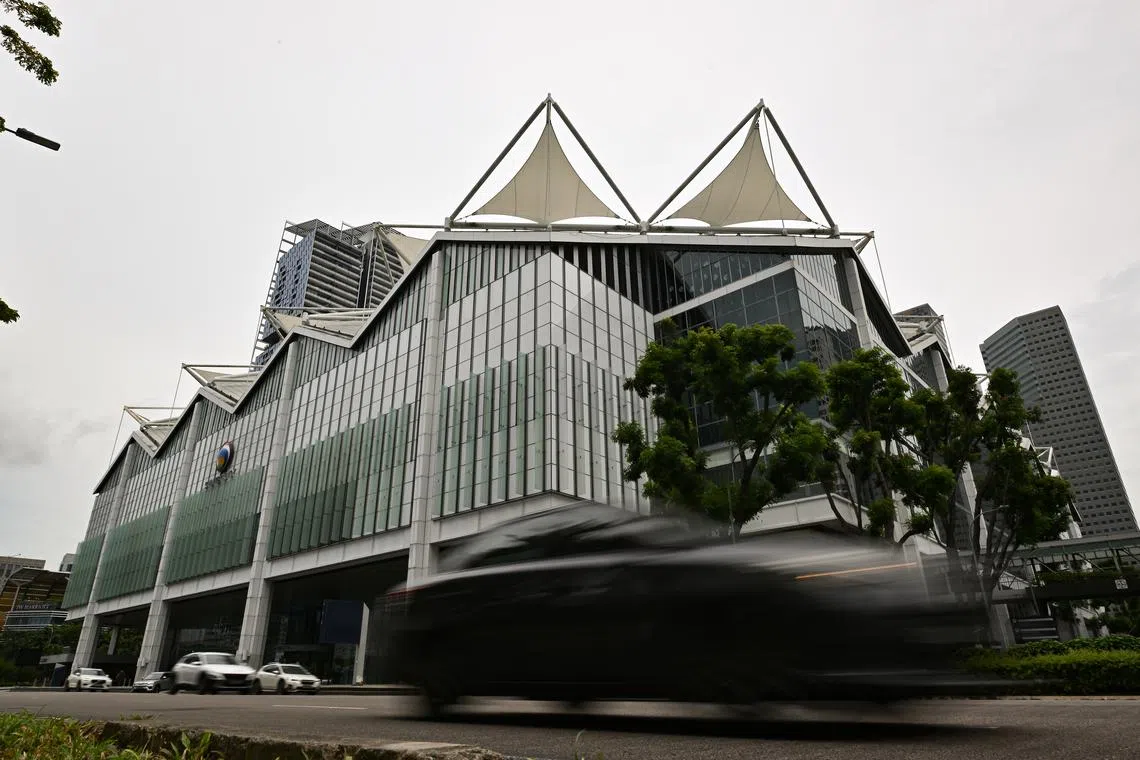World’s most prestigious dermatology congress draws more than 11,000 delegates to Singapore
Sign up now: Get ST's newsletters delivered to your inbox

The 25th World Congress of Dermatology will be held from July 3 to 8 at Suntec Singapore Convention & Exhibition Centre.
ST PHOTO: LIM YAOHUI
SINGAPORE – This week, the Republic will be hosting the largest medical convention to be held here, an event the Singapore Tourism Board (STB) expects will bring in $28 million in tourism receipts.
Beating five other countries to bring in the 25th World Congress of Dermatology (WCD) is a major feather in the cap for Professor Roy Chan, a senior consultant at the National Skin Centre and president of the 2023 event.
To be held from Monday to Saturday at Suntec Singapore Convention & Exhibition Centre, the event organised by the Dermatological Society of Singapore will be attended by more than 11,000 people from 130 countries.
It is regarded as the most prestigious and influential meeting on all matters of the skin – the biggest organ in the human body.
The congress was first held in Paris in 1889, and this is only the third time it is heading to Asia, with Tokyo playing host in 1982 and Seoul in 2011.
Held every four years, it gathers experts who share the latest research, discoveries and treatments.
The more than 200 symposiums and keynote speeches at the 2023 event will cover a wide spectrum of skin-related topics, including psoriasis, skin cancers, aesthetic and procedural dermatology, diseases of the hair and nails, pigmentary disorders, pathology and infections.
There will be a late-breaking abstract – where results of a clinical trial are just out – on a new treatment for a very common form of autoimmune hair loss called alopecia areata. Studies indicate this problem affects 2 per cent of people at some point. Although it can occur at any age, the onset is most frequently seen in people in their 20s and 30s.
The new treatment uses JAK inhibitors that interfere with signals in the body which cause inflammation. It was recently approved in the United States for adolescents 12 years and older – the first time a hair loss treatment has been approved for use in children.
New treatments for eczema – which causes dry, itchy and inflamed skin and affects one in five children – will be another hot topic. Results of a recent clinical trial on the efficacy of biologic therapies will be released at the congress.
Other new treatments include the use of JAK inhibitors.
Given how common eczema is in the population, Prof Chan said: “It is also heartening to know that there are several emerging treatments in the pipeline.”
They are not yet on the market, but their progress will be shared at the congress.
Among them is a biologic product from Singapore-based Aslan Pharmaceuticals. Early-stage clinical trials of 38 patients from Europe, the US and Asia – including patients here from the National Skin Centre and KK Women’s and Children’s Hospital – appear positive.
There is also hope for patients with vitiligo, a disfiguring disorder where people lose their natural skin colour.
Till now, there has been little headway made against the condition. But the outcomes of an early-phase clinical trial of a new treatment have resulted in the first therapy for the pigmentation problem to be approved by the US Food and Drug Administration.
Other topics of interest include state-of-the-art treatments for acne and ageing skin.
While the latest in medical and scientific advances will feature prominently during the sessions, 95 exhibitors will cover over-the-counter cosmetic care. Several major manufacturers, including L’Oreal and Eucerin, will be sharing their latest skincare trends and products.
The congress is supported by the National Skin Centre and the Skin Research Institute of Singapore.
Prof Chan said: “By providing a forum for specialists from all corners of the world, we hope that the WCD2023 will be able to catalyse ideas, increase collaboration and re-establish networks that will expand the boundaries of dermatology knowledge and skin science.”
Dr Edward Koh, STB’s executive director for conventions, meetings and incentive travel, said the congress is “a strategic fit with Singapore’s identified growth and priority industries, which include sustainability and climate change, medtech and advanced manufacturing”.
Such meetings “also facilitate the exchange of knowledge, ideas and capital, attract investment opportunities, and reinforce Singapore’s leadership position in these priority industries”, he said.
The congress will bring “significant spillover benefits to our economy, as it brings in business for our lifestyle and hospitality sectors”, Dr Koh added.
Aside from this congress, which is under the auspices of the International League of Dermatological Societies, there are four more big, first-time-in-Singapore meetings slated for 2023, including the World Conference on Lung Cancer in September.



